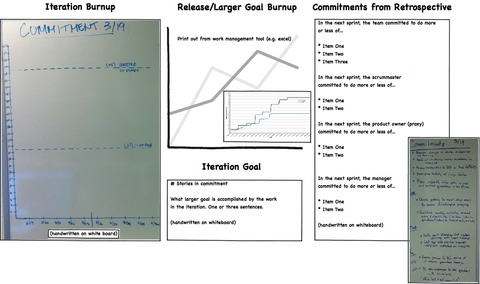I have to admit, I cringe whenever I say “agile” or “scrum” (™?) Even as I practice both every workday and care deeply for the values they represent.
Successful movements take on a cloying “fill me with your knowledge” cast. A perpetual newbie state where new adherents come on faster than existing practitioners have opportunity to develop experience and wisdom.
I really don’t need to have another conversation about how to phrase the first sentence of a user story.
And I definitely feel some of the same heat rising from the attention to lean. Buzz, buzz, kanban, buzz…
But can we blame the thought leaders, the coaches, the industry deriving wealth from a movement for the failings of that movement? Is it the corrupting influence of success or rather broad adoption itself?
I think the latter.
First, let me acknowledge that iterative improvement is a lengthy process and has to start somewhere. That your current state is entirely flawed is a given.
You don’t have to be excellent at what you do at this exact moment to begin improving your own practice and your workplace. A broad swath of not soul killing workplaces is at least as valuable as a small set of shining cities on the hill.
But whatever the starting point, taking on agile practice is dedicating yourself to a mission of fundamentally changing the nature of our work to something both disciplined and highly accountable but also collaborative, creative and sustainable.
And broad adoption means that a lot of people who call themselves “agile” just don’t rise up or even aspire to rise up to that mission.
If you claim you’re doing XP: have 24 hour builds, the developers all work solo and your test coverage is 10% then you’re either at the start of a very long journey (which I deeply admire you for) or you’re lying to yourself and you just plain suck.
If you claim you’re doing Scrum and the developers haven’t talked to a business person in months, can’t articulate what your team achieved in the last month, and you require “stabilization” sprints before you can deploy working code, you are either at the start of a very long journey (which, again, I deeply admire you for) or you’re lying to yourself and you just plain suck.
It’s not one of a thousand consultancies, professional coaches, certification tracks, associations or conferences fault if you suck.
It’s not Jeff Sutherland’s or Ken Schwaber’s fault if you suck. As a matter of fact, they and their peers have done a great deal to give a great many of us a chance at sucking less.
The mentor/mentee relationship is powerful but it’s up to each of us to do our work with courage, integrity and passion. It’s up to each of us to hold our peers to a standard of competence and care.
“The fault, dear Brutus, is not in our stars, But in ourselves, that we are underlings.”

